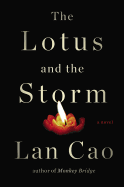
Dazzlingly, Lan Cao (Monkey Bridge) captures Vietnam's dichotomy as both an enchanting realm and a place of carnage. The metaphorical lotus of the title suggests serenity and acceptance, while the storm or "dark mud" surrounding the lotus represents war, the loss of one's country and the struggle for survival in a new home.
Alternating between the voice of Mai, a Vietnamese American law librarian, and her father, Minh, a former commander of the airborne brigade in the South Vietnamese army, The Lotus and the Storm is both epic and intimate. It spans the Vietnam War, from the 1963 coup resulting in the assassination of South Vietnam's first President to the plight of the Vietnamese boat people. It also illuminates an insular, fabled world where a child's grief is alleviated by the verbal eloquence of a mynah bird and where a seasoned soldier finds peace by practicing yoga in a sanctuary amid lush foliage, far from the ripples of warfare and political betrayals.
Offering a rarely discussed perspective on the Vietnam War, Cao's second novel contends that the loss of Vietnam was not inevitable, but due largely to the U.S.'s misguided exit strategy that left South Vietnam vulnerable to the Communist North. Shifting her focus to life in the U.S., Cao also questions the trajectory of material success among Asian Americans. Her novel suggests that a calm, integrated self--in spite of any traumatic history--promises more fulfillment than any outward embrace of the American Dream. As such, The Lotus and the Storm upholds Buddhism's fundamental tenet: the need to cherish the present and let go of lost dreams. --Thuy Dinh, editor, Da Mau magazine.

